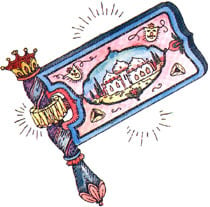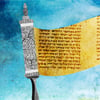Purim and Chanukah are very different holidays. On Chanukah we get spiritual—oil and light and songs of praise et al. On Purim we get physical: money to the poor, food to friends, a big festive meal with lots and lots of wine.
But there is an interesting common denominator: the customs surrounding the two festivals both include a spinning toy. On Chanukah, it is customary to play with a dreidel, a spinning top inscribed with the Hebrew letters that form an acronym of the phrase, "A great miracle happened there." On Purim we spin a noisemaking device called a gragger to drown out the name of the wicked Haman.
Still, there's a difference: the dreidel is spun from above, while the gragger is turned from below.
On Chanukah, G‑d violated all laws of nature to save us, as a small band of fighters defeated one of the mightiest armies on earth and a cruse of oil burned for eight days. On Purim, the salvation came about in what could easily be seen as a series of lucky coincidences: King Achashverosh gets angry at his wife, and selects Esther as queen in her place; Mordechai happens to overhear a plot to kill Achashverosh and saves the king's life; Haman happens to be "in the wrong place at the wrong time" just when Mordechai's deed is being read to the sleepless king; Esther uses her position and influence to turn the king against Haman; and so on. In fact, one hardly notices that G‑d's name is not even mentioned in the Book of Esther! In other words, on Chanukah the divine salvation came "from above," while on Purim it came "from below," disguised in ordinary events.
Chanukah celebrates the fact that our commitment to G‑d, and His to us, transcends all natural bonds. Purim celebrates that our relationship also pervades the most ordinary, everyday details of our lives.1








Join the Discussion